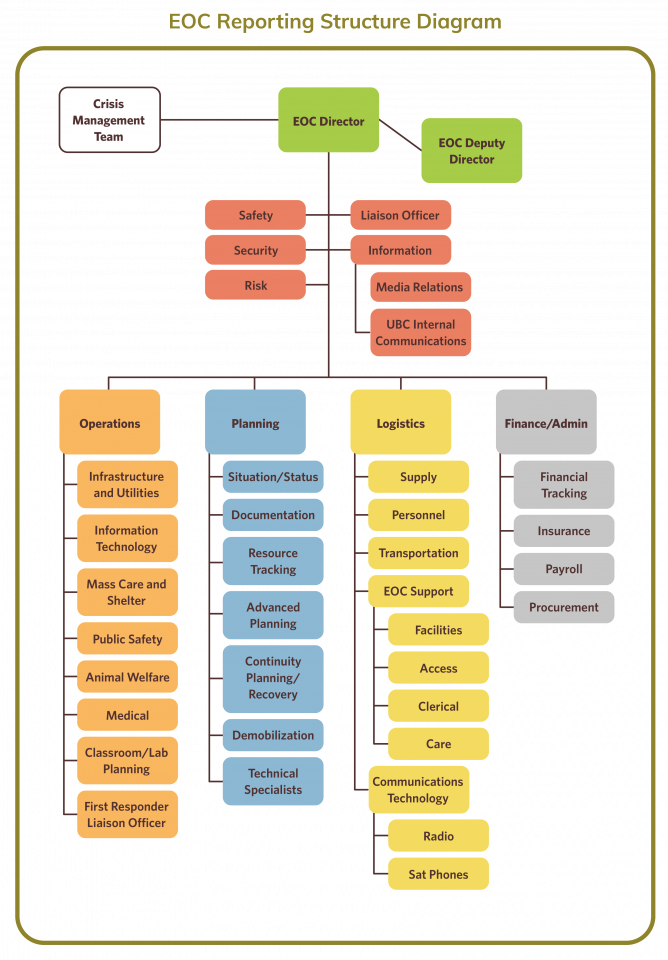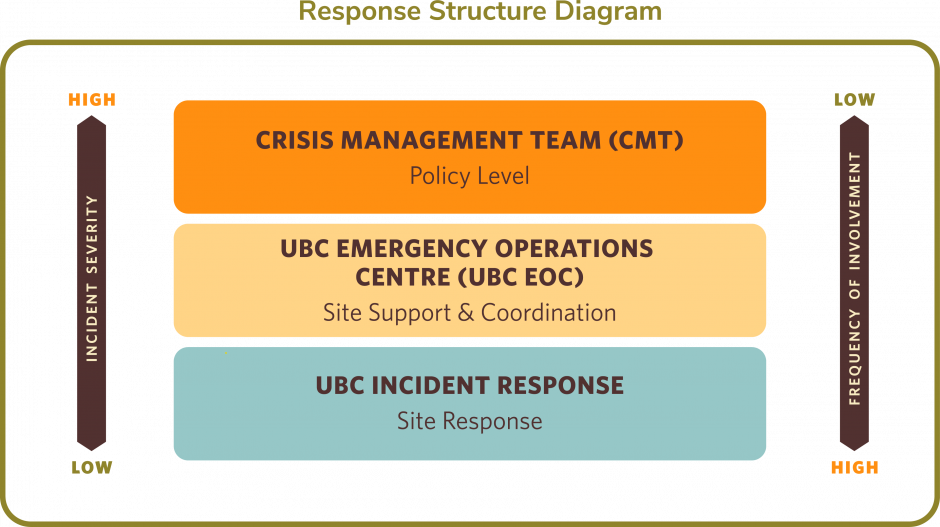UBC has response structures and processes in place to deal with all manner of emergencies. Built upon the elements of preparedness, response, recovery, and mitigation, UBC has developed and maintained an emergency management program based on the BC Emergency Management System (BCEMS), a recognized standard system for emergency response across British Columbia.
Menu
UBC’s Response Structure
Emergency Operations Centre
Post-emergency
Emergency communication – UBC Alert
UBC’s Response Structure
UBC’s response structure is a three-tiered system made up of Incident Response (Incident Command) at the scene, an Emergency Operations Centre (EOC) to coordinate at an organizational level, and a Crisis Management Team to make policy-level decisions.
When an incident happens on campus, UBC departments respond, sometimes in coordination with police, fire and ambulance. When the EOC is not activated, Departmental Operation Centres may be stood up to manage the incident. If an incident significantly strains or overwhelms these responders, trained people come together forming the UBC EOC to coordinate information and resources to support the management of the incident.
The UBC Crisis Management Team is made up of the President and UBC Executives to manage emergencies, business interruptions and emerging issues which could have a major negative impact on UBC’s ability to achieve its objectives and successfully execute its strategies.
No matter the nature of the emergency, there are four key priorities when responding:
- Protection of life safety — Ensure the safety and well-being of all members of the UBC Vancouver community and visitors to the campus.
- Incident stabilization — Contain the incident to keep it from expanding.
- Property and environmental preservation — Minimize damage to property and the environment.
- Mission continuity/resumption — Re-establish teaching, research, and other mission-critical activities with minimal disruption.
Emergency Operations Centre
An Emergency Operations Centre (EOC) is a predesignated location where people come together to manage the response to an event that has significantly strained or overwhelmed regular operations. An EOC involves responders from the site of the incident (i.e. UBC), but may also require coordination with multiple external responders or agencies.
Emergency responses often bring together a team of people with a variety of skill sets often from multiple agencies. To be effective, a common approach to the command, control, and coordination of the response is needed. This standard approach is referred to as an Incident Command System (ICS).
When emergencies require significant resources or management, organizations require a strategic level of support to coordinate an effective response. Under ICS, this is the role of an Emergency Operations Centre (EOC).
When is an EOC activated?
An EOC may be activated when:
- A significant number of people are at risk or impacted
- Response coordination is required
- Resource coordination is required
- Uncertain conditions or a need to monitor
- Potential threat, imminent or actual impact to people, property or the environment
- Concern that normal operations may be overwhelmed
- Major planned event
How do we implement this at UBC?
Every year, UBC holds an emergency training exercise to better position individuals and the institution for real emergencies. This is a planned and controlled emergency exercise that allows UBC to practice elements of the UBC Emergency Management Plan, including the activation of the EOC.
Exercises are held each year during spring. The emergency scenario is shared publicly with the university community in advance. Several external agencies are involved as part of the event, just as they would be in a real emergency.
For more information about the training exercise, view Emergency Management Program Training Exercises.

For more information on UBC’s Response Structures and the Emergency Operations Centre, view the ‘Crisis Management Plan’ and ‘Emergency Response Plan’ here.
^ Back to Top
Post Emergency
In the event of a major emergency such as an earthquake, look for direction from emergency responders about where to go to get supports like shelter and food.
After an Incident
The most important thing you can do after an emergency is to take care of yourself and stay safe. The university will be working hard to get support and care to those affected.
A disaster is a traumatic event, and it can take some time to get your bearings. It’s common to feel bewildered or shocked. Don’t panic, check yourself for injuries and assist others if you’re able.
Mass care support
In the aftermath of an emergency, UBC will provide mass care support — shelter, food, and care support to the community. We plan for, and practise, our ability to establish these supports as quickly as possible. You can help contribute to the success of our community’s response and recovery by preparing yourself to be self-sufficient for the first 72hrs.
Do not use your cell phone except to report a life-threatening injury — try to leave phone lines open for emergency personnel.
Please do not donate any food or clothing after an emergency — money is preferred.
No area on earth is completely immune from a disaster. UBC will actively plan, practise, and establish supports as quickly as possible.
^ Back to Top
Emergency Communication – UBC Alert
UBC Alert is the university’s mass notification system to send alerts in urgent situations that pose an immediate safety or security risk to the community. The system is supplied by an external organization called AppArmor, and messages are coordinated on UBC’s main website ubc.ca, X (formerly known as Twitter) @ubcnews, and digital signage across campus
Please add the UBC Alert phone numbers to your contact list so you are aware of any incoming UBC Alert notifications.
Voice calls: 604-670-8223
Text messages: 723-389
Why is this needed?
In an urgent situation on campus, we want to increase the likelihood that students, faculty, and staff receive the latest information about what is happening as soon as possible. This way, you can make informed decisions that prioritize your personal safety.
These kinds of systems are becoming common in Canadian colleges and universities, and are part of the university’s commitment to proactively plan for rare but possible emergency situations.
When will UBC Alert be used?
UBC Alert will be used in active and urgent situations that require your immediate attention because they have the potential to:
- Result in serious harm to people;
- Cause substantial damage to property; and/or
- Disrupt the usual activities of the university.
UBC Alert will broadcast information in situations such as:
- Campus closures due to severe weather
- Building evacuations because of infrastructure- or security-related issues; and/or
- The rare case of an active threat situation and the call to Get out. Hide. Fight
The Director of Emergency Management will determine on a case-by-case basis if the size and severity of the incident has a likelihood of impacting the UBC community, property or operations and warrants the use of the system.
Sign up for UBC Alerts
Faculty and Staff
Including a mobile number in your Workday contact information will enable UBC to send you alerts in urgent situations that pose an immediate safety or security risk to the community.
You can review and edit your contact information by logging into Workday.
For information on how to access Workday and update your contact information, visit the Workday Knowledge base.
If you encounter problems when using Workday, please visit the Integrated Service Centre (ISC).
Students
Log into the UBC Student Service Centre.
Add your cell phone number to ‘Your Details.’
University Neighbourhoods Association (UNA) Residents
Your UNA Account primary contact number is connected to UBC Alert. If you have a UNA Account, we encourage you to check if your emergency contact information is correct by updating your “Primary Phone” on your UNA Profile Page. Alternatively, you can email support@myuna.ca for updates or changes.
If you do not have a UNA Account, you can sign up online or by visiting any UNA community center.
Download the UBC Safe App
UBC Safe is the official mobile safety app of UBC Vancouver (Point Grey). This multi-function app allows you to receive important safety push notifications, safety information, contacts, maps and procedures — all in one place!
- UBC push notifications: Turn on your push notifications to receive immediate information and updates that are impacting the entire campus — e.g. weather advisories, class cancellations, etc.
- Campus resources: Access important safety and support resources in one convenient place.
- Critical services: Connect with Campus Security for assistance, access First Aid when needed, or arrange for SafeWalk to your car.




